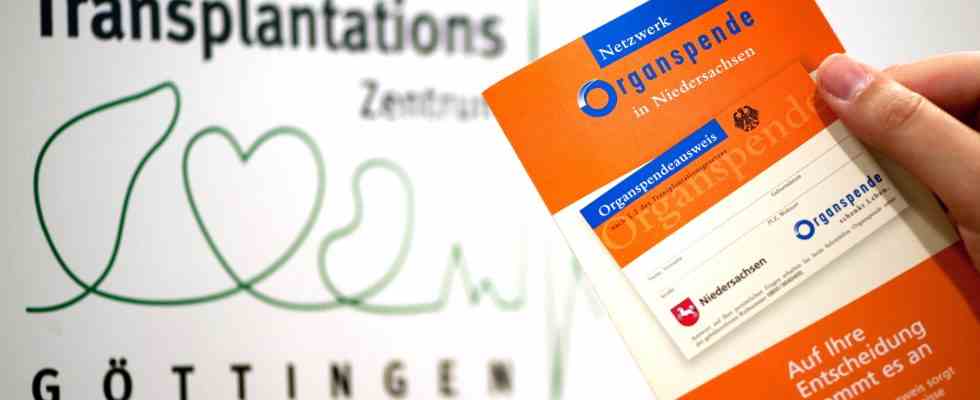Exclusive
Status: 03/15/2023 06:03 a.m
In Germany, the number of organ donors continues to fall. A lot of money has been invested since 2019 to improve the structures in the clinics. A basic problem was not addressed.
Although a lot of money has been invested in improving structures and financial incentives have been set for hospitals, the number of organ donors in Germany continues to fall. In 2022 there was another slump – from an already low level.
This means that the chances of survival for seriously ill people who need a donor organ are worse in Germany than in Austria, Spain or the USA. In total, only 2,662 organs were donated postmortem in Germany last year. But there are around 8,500 seriously ill people on the waiting list.
In 2019, with the second amendment to the Transplantation Act, the federal government had significantly increased the case flat rates for the removal clinics – from previously 5,310 euros to now 19,752 euros per removal operation, according to a response from the Federal Ministry of Health (BMG) to a request from MDR Investigative emerges. Overall, the total budget for “reimbursement of expenses for removal hospitals” has quadrupled from 6.3 million euros in 2019 to a good 23 million euros (2022).
Funding for better organ donation structures was also increased. With the help of screening systems, eligible patients can now be better recorded and a possible organ donation can be discussed with relatives by transplant officers at the clinics in a timely manner. A more effective mediation of the organs is also possible in this way. In 2018 there was a flat rate of 18 million euros for all 1,200 hospitals. According to the BMG, more than 40 million euros are planned annually.
Objection solution in almost all neighboring countries
Nevertheless: In a European comparison, Germany ranks far behind when it comes to organ donations. In Spain, a good 40 people per million inhabitants donated in 2021. In Croatia and Portugal it was almost 30, in Austria more than 20. In Germany, on the other hand, it was only 11.2. In 2022 it was even less at 10.3.
The difference: in many neighboring countries, the opt-out solution applies. This means that everyone is a potential organ donor unless they explicitly decline. In Germany, on the other hand, the extended decision solution applies. Here, an organ removal must be actively approved.
Many find it difficult to make decisions
This has consequences: This is shown, for example, according to a non-representative but weighted survey by the opinion barometer MDR asks among around 24,000 people from Saxony, Saxony-Anhalt and Thuringia that 51 percent of those surveyed find it difficult to make a decision to donate an organ for a close relative. Only 27 percent find it difficult for themselves.
Another reason: In Germany, the world’s strictest conditions apply to organ removal when brain death is determined, as the transplant officer at the Leipzig University Hospital, Svitlana Ziganshyna, explains. Here, an organ donation can only take place in the rare case of brain death, after two independent confirmations. In some other countries, organ donation is also possible in the event of cardiovascular death – this would mean that more organs would be available. For years now, about every tenth patient in Germany who is on the waiting list for a donor organ has died.
Objection solution is debated again
In addition to the amendment to the Transplantation Act in 2019, the “Act to Strengthen Decision-Making in Organ Donation” in 2022 should increase the number of organ donations. In March of last year, an online register for voluntary registration was supposed to go online. According to the BMG’s response, this should MDR Investigative only come in 2024. Cost point: 16 million euros. In addition, more money is to be made available in the future. An additional 20 million euros per year are planned for consulting services by general practitioners.
However: According to the BMG’s response, the poor donor numbers since 2020 could also be partly due to the corona pandemic and the enormous burden on the clinics. Likewise, medical contraindications increased due to the increased age of the potential donors. The Federal Ministry is currently analyzing the possible causes of this situation very thoroughly.
Due to the slump in organ donations in 2022, the debate about the objection solution is currently flaring up again – among others by Federal Minister of Health Karl Lauterbach. Three years ago there had been this discussion across all parties. However, after intensive debates on the content, the decision found a majority, and the basic principle of voluntary approval remained. For this purpose, organ donation should be advertised more, for which the budget had been increased.

